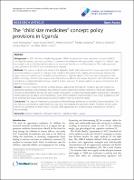| dc.contributor.author | Nsabagasani, Xavier | |
| dc.contributor.author | Ogwal-Okeng, Jasper | |
| dc.contributor.author | Mbonye, Anthony | |
| dc.contributor.author | Ssengooba, Freddie | |
| dc.contributor.author | Nantanda, Rebecca | |
| dc.contributor.author | Muyinda, Herbert | |
| dc.contributor.author | Hansen, Ebba Holme | |
| dc.date.accessioned | 2019-10-31T09:30:10Z | |
| dc.date.available | 2019-10-31T09:30:10Z | |
| dc.date.issued | 2015 | |
| dc.identifier.citation | Nsabagasani, X., Ogwal-Okeng, J., Mbonye, A., Ssengooba, F., Nantanda, R., Muyinda, H., & Hansen, E. H. (2015). The “child size me | en_US |
| dc.identifier.uri | https://hdl.handle.net/123456789/78 | |
| dc.description.abstract | Background: In 2007, the World Health Organization (WHO) launched the ‘make medicines child size’ (MMCS)
campaign by urging countries to prioritize procurement of medicines with appropriate strengths for children’s age
and weight and, in child-friendly formulations of rectal and flexible oral solid formulations. This study examined
policy provisions for MMCS recommendations in Uganda.
Methods: This was an in-depth case study of the Ugandan health policy documents to assess provisions for MMCS
recommendations in respect to oral and rectal medicine formulations for malaria, pneumonia and diarrhea, the
major causes of morbidity and mortality among children in Uganda- diseases that were also emphasized in the
MMCS campaign. Asthma and epilepsy were included as conditions that require long term care. Schistomiasis was
included as a neglected tropical disease. Content analysis was used to assess evidence of policy provisions for the
MMCS recommendations.
Results: For most medicines for the selected diseases, appropriate strength for children’s age and weight was
addressed especially in the EMHSLU 2012. However, policy documents neither referred to ‘child size medicines’
concept nor provided for flexible oral solid dosage formulations like dispersible tablets, pellets and granules- indicating
limited adherence to MMCS recommendations. Some of the medicines recommended in the clinical guidelines as first
line treatment for malaria and pneumonia among children were not evidence-based.
Conclusion: The Ugandan health policy documents reflected limited adherence to the MMCS recommendations. This
and failure to use evidence based medicines may result into treatment failure and or death. A revision of the current
policies and guidelines to better reflect ‘child size’, child appropriate and evidence based medicines for children is
recommended. | en_US |
| dc.language.iso | en | en_US |
| dc.publisher | Journal of Pharmaceutical Policy and Practice | en_US |
| dc.subject | Essential medicines | en_US |
| dc.subject | Child size medicines | en_US |
| dc.subject | Uganda | en_US |
| dc.title | The “child size medicines” concept: policy provisions in Uganda | en_US |
| dc.type | Article | en_US |

